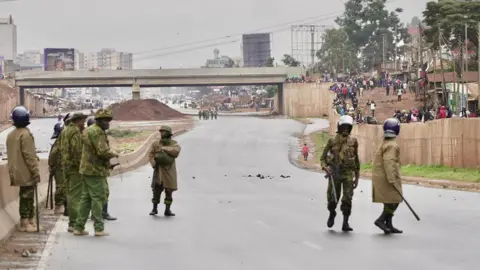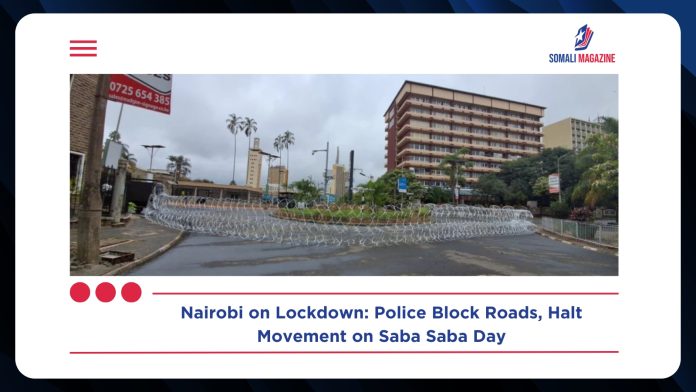Facebook Twitter (X) Instagram Somali Magazine - People's Magazine
Police block roads, curtail movement of Kenyans on Saba Saba, triggering widespread disruption across Nairobi and other major towns as security forces moved to pre-empt planned protests marking the historic pro-democracy day. On Monday morning, Kenyans woke up to a city under lockdown, with heavily armed police officers mounting roadblocks on nearly every major artery leading into the Central Business District (CBD).
From Thika Road to Waiyaki Way, Mombasa Road to Ngong Road, and Valley Road to Lang’ata Road, access was restricted for both private and public service vehicles. Only emergency and government vehicles were allowed through, forcing thousands of commuters to walk long distances or abandon their journeys altogether.
The unprecedented security clampdown came ahead of the annual Saba Saba Day commemorations, which mark the July 7, 1990 uprising that catalyzed Kenya’s transition to multiparty democracy. This year’s protests, largely driven by youth activists and Gen Z organizers, were expected to highlight grievances over corruption, police brutality, economic inequality, and the erosion of civil liberties.
Despite government assurances that July 7 would be a normal working day, the capital resembled a ghost town. Businesses remained shuttered, schools closed, and public transport ground to a halt. In some areas, long-distance buses were parked outside police stations, unable to proceed past barricades.

The area around Parliament was heavily fortified with razor wire and riot police, while key intersections were sealed off with concrete barriers. In Mombasa, similar scenes played out as police blocked the Dongo Kundu bypass and other key routes, preventing youth from traveling to Nairobi after attending a coastal festival.
Interior Cabinet Secretary Kipchumba Murkomen defended the security measures, stating that law enforcement was on high alert to prevent infiltration by criminal elements. “Our agencies are prepared to deal decisively with anyone seeking to cause mayhem under the guise of peaceful protest,” he said.
However, civil society groups and human rights defenders condemned the government’s response as excessive and unconstitutional. On Sunday, unidentified individuals stormed the offices of the Kenya Human Rights Commission in Nairobi, disrupting a press conference and injuring at least one board member.
Online, Kenyans expressed outrage and disbelief at the scale of the lockdown. Social media platforms were flooded with images of empty streets, stranded commuters, and police barricades. Many users mocked the government’s actions, noting the irony of shutting down the city to prevent disruption—only to cause it themselves.
“This is the best form of protest—civil disobedience,” one user wrote. “All we need to do is whisper ‘maandamano’ and boom, holiday activated.” Another added, “No business looted. No car burnt. No Kenyan shot. No police officer throwing teargas. Saba Saba was a success by 8:00 a.m.”
The heavy-handed approach has reignited debate over the right to peaceful assembly and the state’s role in safeguarding democratic freedoms. While the day remained largely calm, the message from the streets was unmistakable: Saba Saba still resonates, and the fight for justice and accountability in Kenya is far from over.

